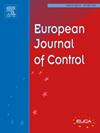Information transfer and its control in linear discrete stochastic systems
IF 2.6
3区 计算机科学
Q2 AUTOMATION & CONTROL SYSTEMS
引用次数: 0
Abstract
Information transfer is defined as a measure of the causal inferences between dynamical events. We quantify information transfers and study their responses to interventions or external signals within components of linear discrete stochastic systems. To quantify the causal inferences, we find the difference between the rate of change in the differential entropy of a marginal measure at a given coordinate in the presence and absence of another fixed coordinate. We also integrate theories from optimal control and information theory to compute control signals that result in desired information transfers within the dynamical components. To optimally steer the information transfer to the desired value, we convert the control problem into a nonlinear program, which can be solved numerically. We illustrate our theory with an example of a wireless communication system consisting of various transmitters and receivers. In particular, given a well-defined transmission channel model and the noise, we show that the signal-to-interference-plus-noise ratio, SINR of a receiver due to interference from various transmitters is a function of information transfers to the receiver from the transmitters, and controlling these transfers to desired values aligns with controlling the SINR experienced by the receiver.
线性离散随机系统的信息传递及其控制
信息传递被定义为动态事件之间因果关系的度量。我们量化了信息传递,并研究了它们对线性离散随机系统组件内的干预或外部信号的响应。为了量化因果推论,我们发现在存在和不存在另一个固定坐标的情况下,在给定坐标上边际度量的微分熵的变化率之间的差异。我们还整合了最优控制和信息论的理论来计算控制信号,从而在动态组件中产生期望的信息传递。为了最优地引导信息传递到期望值,我们将控制问题转化为非线性程序,可以用数值方法求解。我们用一个由各种发射器和接收器组成的无线通信系统的例子来说明我们的理论。特别是,给定一个定义良好的传输信道模型和噪声,我们表明,由于来自各种发射器的干扰,接收器的信噪比(signal-to-interference- + noise ratio)是发射器向接收器传输信息的函数,并且控制这些传输到所需值与控制接收器经历的SINR一致。
本文章由计算机程序翻译,如有差异,请以英文原文为准。
求助全文
约1分钟内获得全文
求助全文
来源期刊

European Journal of Control
工程技术-自动化与控制系统
CiteScore
5.80
自引率
5.90%
发文量
131
审稿时长
1 months
期刊介绍:
The European Control Association (EUCA) has among its objectives to promote the development of the discipline. Apart from the European Control Conferences, the European Journal of Control is the Association''s main channel for the dissemination of important contributions in the field.
The aim of the Journal is to publish high quality papers on the theory and practice of control and systems engineering.
The scope of the Journal will be wide and cover all aspects of the discipline including methodologies, techniques and applications.
Research in control and systems engineering is necessary to develop new concepts and tools which enhance our understanding and improve our ability to design and implement high performance control systems. Submitted papers should stress the practical motivations and relevance of their results.
The design and implementation of a successful control system requires the use of a range of techniques:
Modelling
Robustness Analysis
Identification
Optimization
Control Law Design
Numerical analysis
Fault Detection, and so on.
 求助内容:
求助内容: 应助结果提醒方式:
应助结果提醒方式:


